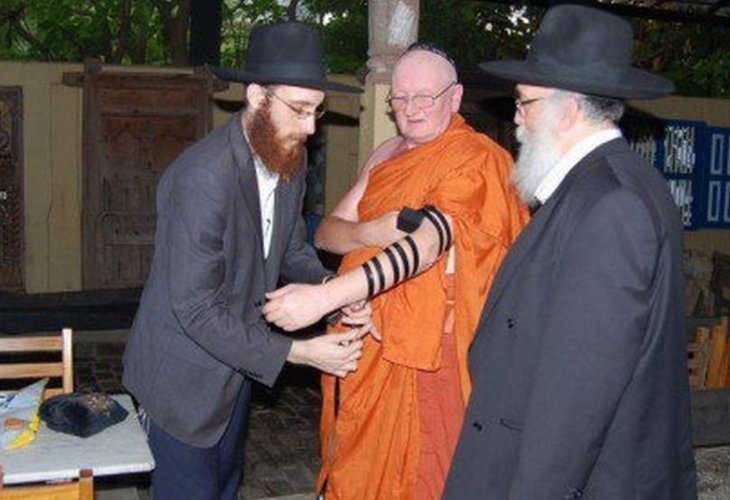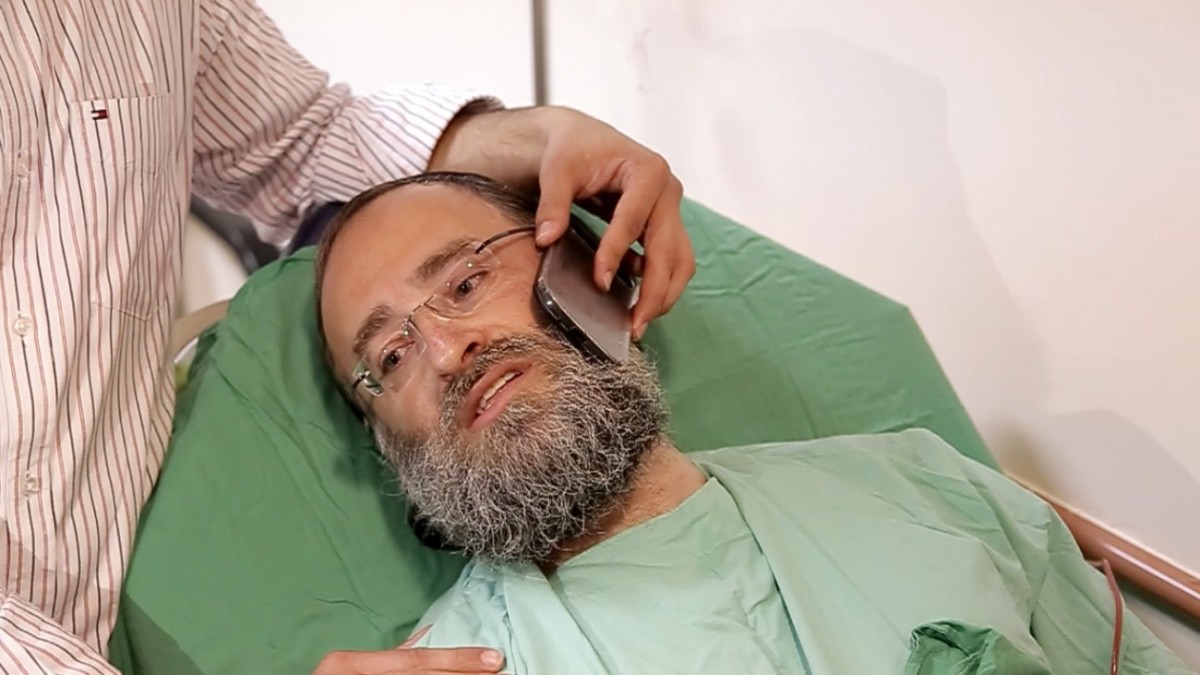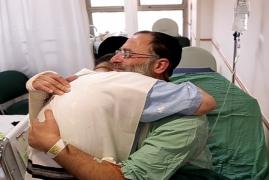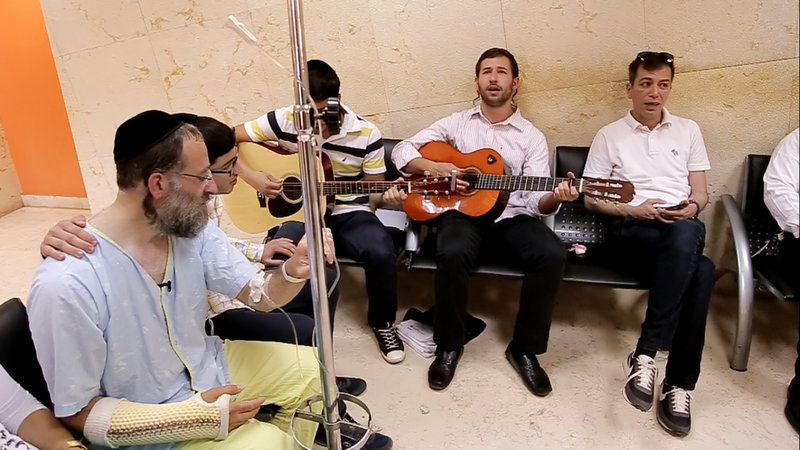I'll Give You My Kidney, and You Give Me Nothing
A man awakens one day and decides to donate a kidney to someone facing the end. He stretches, tells his family, and receives their blessing. The donor: Rafael Shilitz. The recipient: Shlomo Kenplemacher. This is that moment when one reader might just join a nephrology adventure that saves a life.

Let's start from the end, because it's happy and this man's tears have dried after living through the pain of reality. "Right after my daughter's wedding chuppah, Rafael Shilitz approached me," recounts Shlomo Kenplemacher, after the surgery where he received a kidney. "Those were tough days. The device failed, and I went a week without dialysis. We didn’t know what would happen." As the cliché goes, life and death were in the balance. "This was my third device in half a year that didn’t work, and even the doctors were at a loss."
Both his kidneys were barely functioning, and dialysis was the only solution, yet his body rejected it too. The family faced complex challenges, even during his daughter's wedding period. Weeks prior, Rabbis Elimelech Firer and Yeshayahu Haber spoke to him about potential donations and compatibility tests, "but we were so engulfed in survival efforts and dealing with daily illness struggles that we didn’t grasp what they meant. We didn’t have time."
Time for what?
"To consider the transplant option. Mentally, I knew it could save me, but I didn’t pursue it actively. I lived through unimaginable suffering, striving to live another day. You might say meeting Shilitz at the hospital started shifting things for me. And yet, I hadn’t processed it."
The wedding took place as planned, and Shilitz came to offer congratulations. After the chuppah, he approached the parents. "I want to give you a gift for the wedding," Shilitz recalls saying. "I wanted to tell you there’s a match." Kenplemacher understood: his life was saved. The family couldn’t imagine a greater gift. They received their father back. They emphasize that life with dialysis isn’t truly living.

Not Why, Why Not
To those who’ve never donated, I tell Shilitz, the donor, that one can’t comprehend what drives someone to give up a kidney for another, no matter how much you explain or try. "Those who haven't undergone dialysis or seen a loved one suffer, don’t understand the agony involved," he replies.
Shilitz, a 43-year-old resident of Har Shmuel, north of Jerusalem, has a family with six children, and runs his business in Ashdod. Born into the Gur Hassidic sect, he grew closer to Rabbi Nachman. He is a direct descendant of his, and for the past 18 years, regularly visits Uman. In his words: "I’m hooked on the Rebbe." A year ago, on his 42nd birthday, he had an idea for celebration. I want to donate a kidney, he told his wife. She supported him, and he decided to go through with it. Eventually, the surgery took place, and his kidney granted life to Kenplemacher, whom he didn’t know at all.
Why would someone want to donate a kidney?
"Why do the non-Jews say," Shilitz says. "That’s a saying I heard once, and it’s true. Why ask the non-Jews. A Jew doesn’t ask why. That’s a true Hassidic teaching. Unfortunately, today it’s more common to ask why, but that’s a mistake. It’s a mistake even among Torah scholars. There’s no why. How can you ask why."
Forget why. How? How does it happen?
He concedes. "That’s another question. And honestly, I can only tell you how it happened. The complete answer is only known to the One who knows mysteries."
He is warm, pleasant, and profound, with simplicity second only to his wisdom and his clear articulation. "I’ve always been a compassionate person," he admits. "I didn’t like the aggression or selfishness. They grated on me. That’s how I was, and I’m not saying this to make myself look better or worse. It’s just how I was."
Until the birthday morning, he knew little about the field. "I vaguely remembered a law regarding payment for kidneys and a ban on it in the country, and that dialysis existed for those whose kidneys didn’t work, but I didn’t really know." The urge to donate came unexpectedly. Suddenly. Is donating common? His wife asked. I suppose so, he replied. All right then. Find out what it entails and donate.
It’s not obvious. Still, to donate a kidney. For him, and especially for his wife? "I hadn’t started to understand what this process involved," he laughs. "I thought I’d contact an organization dealing with such matters, and within a few weeks, the kidney would be removed. I told myself: when a person dies, their kidney is taken immediately, so why should it be different in life? I hadn’t yet processed that I’m entering a very long procedure."
As a first step, he contacted Haber. "I heard about the 'Gift of Life' organization, called, and he answered. I said: Hello, I’m interested in donating a kidney. I didn’t anticipate what was about to happen, but he was so excited." Haber thanked him repeatedly and explained the privilege in his path. Shilitz found a kindred spirit and requested a meeting. Excited, Haber sent him for a few preliminary tests to turn him from a potential donor into an actual donor.
Didn't you feel it was too heavy a decision?
"No. When you’re exposed to the ordeal of someone on dialysis, you have no choice. You will do everything and much more to prevent their pain, their lack of life."
From Haber, he learned that his decision required not only physical strength but also mental and emotional fortitude, and that a period where this issue would fill his world awaited him. "He knew exactly, precisely, what he was talking about. That’s how it was. Slowly, the story took over our home, our lives, and those around us, becoming the center."

Just to Stay in This World
Kenplemacher is the other side of it all. He's concise, repeatedly expressing immense gratitude, then paints a bleak picture of a patient from whom hope is taken. Who asks himself daily if this is the end. "We knew Rabbi Firer a bit," he states. "My brother works with him in the organization, and he’s a family friend." Firer accompanied him in recent years as his kidneys began deteriorating. "It didn’t happen overnight. They weakened, and it became clear they couldn't handle the burden. I started preparing for the horrible idea of dialysis."
Dialysis: a treatment designed to replace kidney function. Twice or thrice a week, one must go to the hospital, be connected to machines for several hours, and endure incredible pain. A life reliant on dialysis is no life at all. You revolve around treatments, for which you must install a special device between your body and the medical machinery. "I had to install it on my arm, meaning I couldn’t put on tefillin on my left arm. I refused."
Months of suffering passed, as Kenplemacher went in and out of the hospital. "Conditions worsened, leaving no choice. I arrived at the hospital, and after a series of tests, doctors decided on two devices: a permanent one, to be assembled immediately but operational months later, and a temporary one, until the permanent is functional." After surgery, they were all on his body but failed one after another. Inside a week, the temporary one wasn’t accepted, and the long-term was postponed further. Six months later, he was rushed for another failed operation.
Medical advisors determined: to continue living, you must find another kidney. Strings and connections were pulled, and Kenplemacher was promoted to the top of the list unbeknownst to him. Searches were worrying. A ticking clock loomed. "I was so engaged in striving to stay in this world that I didn’t internalize the ongoing efforts. Firstly, there was Rabbi Firer, who toiled much. A medical representative from Brooklyn also handled me, and of course, Rabbi Haber. Ultimately, he delivered the salvation."
Meanwhile, Shilitz encountered hurdles on his donation journey. It prolonged over time, with failures as well. "Initially, compatibility was tested with a young girl in her teens," he recalls. "Progress began, then halted. No match was found. On another occasion, it was a young woman. She and her husband suffered from a severe illness while caring for her brother after their mother passed away and their father was hospitalized in a mental institution. A very tough case. We thought we found a match, but no. There’s no hundred percent."
When you receive a negative response, don't you step back?
"On the contrary, those responses increased the desire. There was much sorrow for not being able to help that woman. Her unique situation shocked us all. But two months ago, Rabbi Haber told me that a donor was found for her - the granddaughter of a Nazi officer who came here and decided to donate a kidney to atone for her family’s deeds. And there was a match. Four days before my and Shlomo’s surgery, she underwent a successful transplant."
During this time, the kidney donation topic was frequent in the Shilitz household discussions. The older children (21, 18, and 17) were fully engaged, the younger ones involved. A family donation. Were there concerns? I ask. "No. We talked about the value of donation, our capacity to lessen suffering, and our power to help others. It’s a top-tier educational journey. There are few like it. I can assure you that today, each of my kids stands in line awaiting their personal journey, and that’s our great joy."
It’s difficult to talk about fear and future considerations with someone like Shilitz, who awoke one morning deciding: I donate. Still, what if a close family member needs such a donation, God forbid? Or what if something happens to the remaining kidney, God forbid? "Don’t think about it. It's negligible and not perceived as a real threat."

The Angel Raphael in Operation Shlomo
One day, he gets a call. Haber on the line. Rafael, he tells him, listen. I think I found someone for you. Go to Beilinson. Shilitz, far from the hospital in Petach Tikva, feels as if he’s won the lottery with this call. He hurries to the hospital for the standard tests. "I park and see a haredi, Hassidic, couple parking in a no-parking zone. I approached the husband and said: listen, you could get a ticket. He looks at me and says, 'Don’t worry, I have a handicap sign. It's okay.' That was my first time meeting Shlomo."
They didn’t know each other, and at this stage, weren’t supposed to meet, and Shilitz went up to the fourth floor, commencing the tests. Finished, he went to a donors and recipients meeting organized at the hospital to simplify the complex medical concepts. "Until then, I hadn’t participated in such a meeting, even though I was at an advanced stage, but this time I was sent. Before leaving the room, I noticed on the configured files matching mine the name: Kenplemacher. He hadn’t told me anything. I descended several floors and sat among the participants."
On the side sat a somewhat familiar couple—the ones from the parking lot. Shilitz approached the husband again and asked his name. "He was in quite a poor state, unmistakably so, yet he told me his name. That’s when I understood he was my future recipient. I said to him: Nice to meet you, I’m Rafael Shilitz, and I’m about to donate my kidney to you."
Kenplemacher turned pale. He wasn’t prepared for that moment and was speechless. Shilitz, amiable as always, tried to lighten the mood with little success. After a few minutes, they started talking, but Kenplemacher's significant embarrassment was apparent. They parted ways and agreed to talk again. A long journey of tests and compatibility checks lay ahead.
"We must discuss the bureaucracy," Shilitz tells me. "We met almost seven months before the transplant occurred. Testing is one thing, but endless committees intended to verify personal details prolong for months are a disaster for a person enduring these harsh treatments. It's a threat."
Israeli bureaucracy indeed has a notorious reputation. However, regarding organ donation—considering concerns about the donor receiving compensation—it might be justified, I say. "But it's not just that," Shilitz complains. "A week before the surgery, I broke my arm. I was in a cast, and the hospital said: 'We can’t operate on you like this.' I’m telling you definitively—there's no connection between the arm and the kidney. None. I asked not to postpone again. The summer vacation is near, and I want to be with the family, not lying down. It didn’t help. They always drag on and on. I pushed and pushed until the surgeon announced there was no problem, and the surgery happened on time." The cast was removed two weeks after the transplant.
The positive response delighted everyone—the donor and the recipient, now recovering. The Kenplemacher family still hasn’t recovered from the excitement. "Rafael gave us life," say the children. The connection between Shilitz and Kenplemacher has become a bridge of blood.
Now, both stand and seek to tell the people of Israel something. "Don’t forget that I'm the recipient here," says Kenplemacher. "I come from this place and can’t tell anyone what to do. But for those considering: it’s a great rescue. You have no idea what agonies dialysis life involves." Shilitz adds: "Think about the other person. How can you help them, ease their situation? It doesn’t have to be a kidney donation. Even a blood donation or financial grant. Anything. Be good."
And then they stride toward the future. This time, smiling.
This article was published in the weekly "B'kehila." For a special subscription offer for Hidabroot readers, click here.

